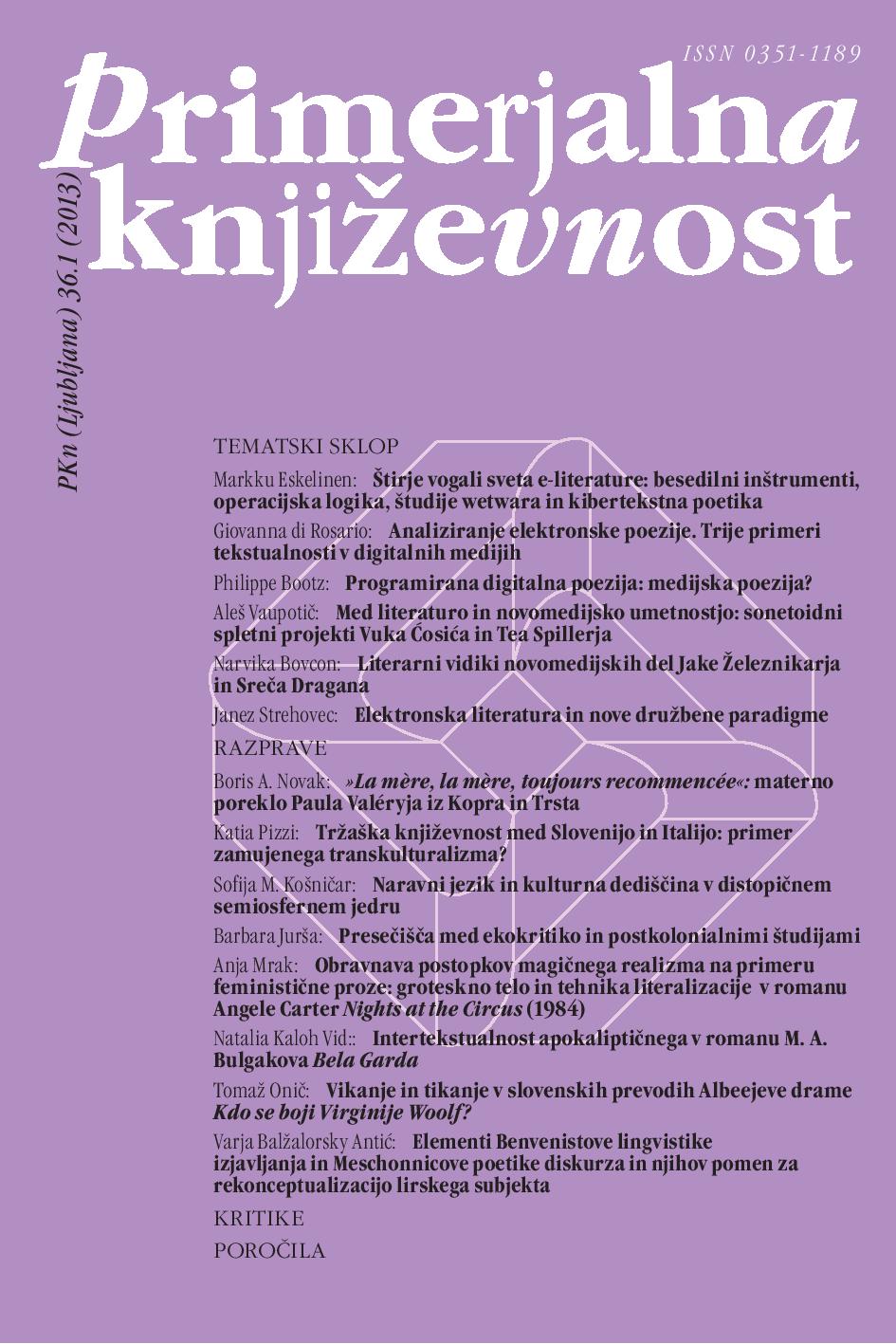Formal and Informal Address in the Slovene Translations of Albee’s Play Who’s Afraid of Virginia Woolf?
Keywords:
English drama, Slovenian translations, Albee, Edward, dramatic style, formal form of address, familiar form of addressAbstract
Translation of T-forms and V-forms from English into Slovene represents a considerable translation problem, the nature of which is mainly stylistic. Unlike in Slovene, there is no linguistic distinction of this kind in modern English, which means that the difference between the two forms in the Slovene text must be introduced by the translator, even in cases when the source text provides no clear information on the degree of formality or politeness that will necessarily be conveyed through the use of one or the other address form in the source text. In literary translation, this issue is most relevant in drama, which by its very nature contains many direct addresses. The choice to use one or the other form in the utterances of dramatic characters is often very complex, since it affects not only the tone of the discourse (and thus the speaker’s register, as defined by Hatim and Mason (50)), but also at least two key elements of the dramatic structure: the characterization of dramatic characters and relationships between them. – The discussion provides several theoretical views on second person address (T-forms; V-forms) in stylistics, and briefly summarizes the historical development (and gradual abandonment) of the distinction between the two forms in Old and Middle English, as well as highlighting the problem in the translation of this language element in languages that still use this distinction today. The final part of the article analyzes the use of the T-form; V-form distinction in two Slovene translations of Albee’s play Who’s Afraid of Virginia Woolf? and assesses how well the translators make use of the opportunities offered by a linguistic and stylistic phenomenon non-existent in the original language.References
Albee, Edward. Who’s Afraid of Virginia Woolf? New York in London: Penguin Books, 1965.
– – –. Kdo se boji Virginije Woolf? Prev. Maila Golob. Delovni prevod, tipkopis. Ljubljana: SNG, 1964.
– – –. Kdo se boji Virginie Woolf? Prev. Zdravko Duša. Kdo se boji Virginie Woolf?, gledališki list. Ur. Mojca Krajnc. Ljubljana: SNG, 1997. 29–72.
– – –. Kdo se boji Virginie Woolf? Prev. Zdravko Duša. Ameriška drama 20. stoletja. Ur. Lado Kralj. Ljubljana: Karantanija, 2001. 255–363.
Birch, Barbara M. »Quaker Speech: A Policy of Linguistic Divergence.« International Journal of the Sociology of Language 116 (1995): 39–59.
Blake, Norman. »The Literary Language.« The Cambridge History of the English Language, Vol. II: 1066–1476. Ur. Norman Blake. Cambridge: CUP, 1992. 524–44.
Brown, Roger in Albert Gilman. »The Pronouns of Power and Solidarity.« American Anthropologist 4.6 (1960): 24–39.
Crystal, David. The Cambridge Encyclopedia of Language. Cambridge: CUP, 2002.
Grosman, Meta. »Književni prevod kot oblika medkulturnega posredovanja leposlovja.« Književni prevod. Ljubljana: Znanstveni inštitut Filozofske fakultete. (Razprave FF). Ur. Meta Grosman in Uroš Mozetič, 1997. 11–56.
Hatim, Basil in Ian Mason. Discourse and the Translator. London in New York: Longman, 1990.
Hervey, Sandor in Ian Higgins. Thinking Translation: A Course in Translation Method: French to English. London: Routledge, 1992.
Hogg, Richard Milne. »Phonology and Morphology.« The Cambridge History of the English Language, Vol. I: The Beginnings to 1066. Ur. Richard Milne Hogg. Cambridge, CUP: 1994. 123–58.
Hribar, Darja. Sestavine sloga Harolda Pinterja v slovenskih prevodih. Doktorska disertacija (neobjavljeno). Univerza v Ljubljani, 1999.
Lass, Roger. »Phonology and Morphology.« The Cambridge History of the English Language, Vol. II: 1066–1476. Ur. Norman Blake. Cambridge: CUP, 1992. 97–122.
– – –. »Phonology and Morphology.« The Cambridge History of the English Language, Vol. III: 1476–1776. Ur. Roger Lass. Cambridge: CUP, 1999. 140–62.
Leech, Geoffrey in Mick Short. Style in Fiction. London in New York: Longman, 1981.
Lefevere, Andre. Translation, Rewriting and the Manipulation of Literary Fame. London in New York: Routledge, 1992.
Leith, Dick. A Social History of English. London in New York: Routledge & Kegan Paul, 1987.
Mencken, Henry Louis. The American Language: An Inquiry into the Development of English in the United States. New York: A. A. Knopf, 1921.
Miklič, Tjaša. »Prevajalec naj lepo samo prevede tisto, kar tam piše: o prevajalčevi vlogi v komunikacijskem procesu.« Uporabno jezikoslovje 7–8 (1999): 10–24.
Mozetič, Uroš. »The Impact of Translation Deviation upon the Reception of Eugene O’Neill’s Plays in Slovenia.« American Literature for Non-American Readers: Cross-Cultural Perspectives on American Literature. Frankfurt ob Majni: Peter Lang. Ur. Meta Grosman, 1995. 123–38.
– – –. Problem pripovednega gledišča in žariščenja pri prevajanju proznih besedil. Ljubljana: Znanstveni inštitut Filozofske fakultete, 2000. (Razprave FF).
Mustanoja, Tauno F. A Middle English Syntax. Part 1, Parts of Speech. Helsinki: Société Néophilologique, 1960.
Reindl, Donald. »Slovene Ultra-Formal Address: Borrowing, Innovation, and Analysis.« Slovene Linguistic Studies 6 (2007): 151–68.
Shakespeare, William. William Shakespeare: The Complete Works. Oxford in New York: Claredon Press, 1988.
Shelley, Percy Bysshe. »Ode to the West Wind.« Poetry of the Romantics. Ur. Paul Driver. London in New York: Penguin, 1996. 40.
Szondi, Peter. Teorija sodobne drame. Ljubljana: Mestno gledališče ljubljansko, 2000.
Toporišič, Jože. Slovenska slovnica. Maribor: Obzorja, 1976.
Toury, Gideon. In Search of a Theory of Translation. Tel Aviv: Univerza v Tel Avivu in Porterjev Inštitut za poetiko in semiotiko, 1980.
– – –. Descriptive Translation Studies and Beyond. Amsterdam in Philadelphia: John Benjamins, 1995.
Wales, Katie. »Thou and You in Early Modern English: Brown and Gilman Re-Appraised.« Studia Linguistica 37 (1983): 107–25.
Walker, Terry. »The Choice of Second Person Singular in Pronouns in Authentic and Constructed Dialogue in Late Sixteenth Century English.« Corpus Linguistics and Linguistic Theory: Papers from the Twentieth International Conference on English Language Reaseach on Computerized Corpora. Ur. Christian Mair in Marianne Hundt. Amsterdam: Rodopi, 2000. 38–53.
Zupan, Simon. Slogovni prevodni premiki v romanu Zbogom, orožje. Doktorska disertacija (neobjavljeno). Univerza v Ljubljani, 2009.


